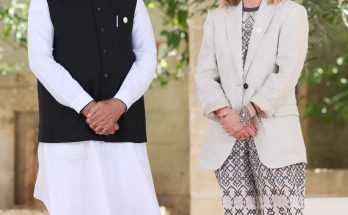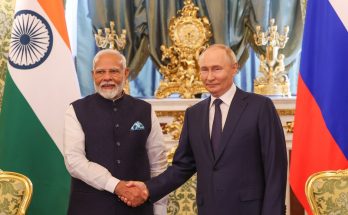
By Simran Walia
India’s Prime Minister Narendra Modi and Japanese counterpart Yoshihide Suga held a telephonic conversation and discussed intensifying collaboration to combat the coronavirus pandemic and exploring resilient supply chains.
“The two leaders discussed the COVID-19 situation in the respective country and exchanged views on various regional and global challenges posed by the pandemic,” said India’s external affairs ministry after the telephonic conversation on April 26.
“They highlighted the importance of close India-Japan cooperation to overcome these challenges, such as by working together to create resilient, diversified and trustworthy supply chains, ensuring reliable supply of critical materials and technologies, and developing new partnerships in manufacturing and skill development.”
This was in line with the diversification of supply chains which started last year due to the pandemic. India and Japan hope to cooperate in securing their supply chains which may further give a boost to the economy.
During the talks, Japan’s Suga ‘wished’ for India’s early recovery from the “current spread of COVID-19 under the leadership of Prime Minister Modi, and the two leaders concurred that they would work in closer cooperation towards containing the pandemic”, a statement from Japanese foreign ministry said.
Japan has provided 50-billion-yen Covid emergency assistance, 30-billion-yen social protection assistance and 1-billion-yen grant assistance to India to deal with the pandemic.
The two leaders also emphasised the need for early operationalisation of the specified skilled workers (SSW) agreement to widely synergise their strengths and achieve mutually beneficial outcomes. The agreement of SSW was created in 2019 by Japan to accept foreign nationals who have expertise and skill. Furthermore, in January 2021, a Memorandum of Cooperation was signed between India and Japan on a basic framework for the partnership for proper operation of the system about specified skilled workers. This MoC would help in promoting the movement of skilled workers from India to Japan.
The two leaders also discussed the Mumbai-Ahmedabad high-speed rail (MAHSR) project as an example of the cooperation between India and Japan and welcomed steady progress in its execution. It is an under-construction high-speed rail line connecting India’s economic hub Mumbai with the city of Ahmedabad.
Going forward, the two leaders are planning to accelerate their cooperation in the Quad framework which is seen as a counterweight to China’s growing clout in the region. Japan has always been concerned regarding unilateral attempts to change the status quo in the East and the South China Sea. Cooperation towards realising a free and open Indo-Pacific is vital for both India and Japan.
While the Indian statement on the telephonic conversation did not mention China, the Japanese read out said Prime Minister Suga expressed ‘serious concerns’ about China’s ‘continued and strengthened unilateral attempts to change the status quo in the East and South China Seas, including the Coast Guard Law.” Chinese coast guard law passed in January of this year allows Chinese forces to use lethal force against Foreign Ships.
The two leaders further appreciated the support and facilitation provided to resident citizens in their respective countries during the pandemic. Prime Minister Modi also thanked Prime Minister Suga for assisting India in combating the pandemic. Nevertheless, Mr Modi expressed hope that he would welcome PM Suga in India soon when the situation stabilizes, for better ties between the two countries.
India and Japan have also postponed their foreign and defence ministerial talks due to increasing Covid cases in India.
This was the first conversation between the two leaders after PM Suga cancelled a planned visit to India due to the resurgence of coronavirus infections in the country and the worsening situation of the pandemic in India. The trip was intended to focus Japan’s cooperation with India in achieving a ‘free and open Indo-Pacific’ as both nations look to counter China’s military build-up and assertiveness in the region. This would have been the first face to face meeting between the two leaders, wherein they were also supposed to discuss the promotion of bilateral collaboration in the fields of outer space and cybersecurity.
Author Profile
- India Writes Network (www.indiawrites.org) is an emerging think tank and a media-publishing company focused on international affairs & the India Story. Centre for Global India Insights is the research arm of India Writes Network. To subscribe to India and the World, write to editor@indiawrites.org. A venture of TGII Media Private Limited, a leading media, publishing and consultancy company, IWN has carved a niche for balanced and exhaustive reporting and analysis of international affairs. Eminent personalities, politicians, diplomats, authors, strategy gurus and news-makers have contributed to India Writes Network, as also “India and the World,” a magazine focused on global affairs.
Latest entries
 In ConversationJuly 26, 2024India-Italy defence collaboration can extend to third countries: Anil Wadhwa
In ConversationJuly 26, 2024India-Italy defence collaboration can extend to third countries: Anil Wadhwa In ConversationJuly 23, 2024Italy views India as a key partner in Indo-Pacific: Vani Rao
In ConversationJuly 23, 2024Italy views India as a key partner in Indo-Pacific: Vani Rao DiplomacyJune 29, 2024First BRICS unveils a roadmap for boosting tourism among emerging economies
DiplomacyJune 29, 2024First BRICS unveils a roadmap for boosting tourism among emerging economies India and the WorldJune 11, 2024On Day 1, Jaishankar focuses on resolving standoff with China
India and the WorldJune 11, 2024On Day 1, Jaishankar focuses on resolving standoff with China






